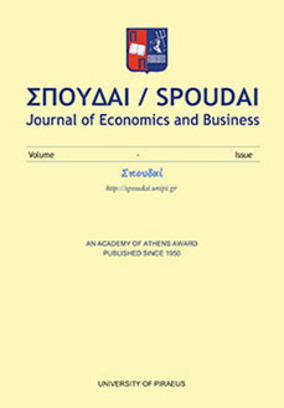The effect of maritime security regime (ISPS Code) on world supply of seafarers
Part of : Σπουδαί : journal of economics and business ; Vol.64, No.1, 2014, pages 63-77
Issue:
Pages:
63-77
Abstract:
The efforts of IMO on the security of ports and ships after 11/9 are presented. IMO’s resolution on fatigue of crews -cause of marine accidents- is also presented. The introduction of ISPS code -carried out under the pressure of USA- made by a non holistic approach, created a number of issues involving and affecting seafarers. IMO and ILO, and other industry’s organizations, but USA, tried subsequently to correct this repercussion. ISPS created four issues: the fair treatment of seafarers –especially serious in USA ports; shore leave; SUA and PSI conventions, which all changed seafarers’ working conditions, analyzed here. Important is also the ‘criminalization of seafarers’, which had the most serious impact on crews. Moreover, examined is the possible impact of MLC 2006 Convention -in force since 2013- on seafarers supply. The efforts of OECD countries and EU, to reverse the falling supply of well qualified marine officers in last 10 years or so, showing in 2010 a deficit of 13,000 officers, are shown. This problem is more acute when world fleet grows, as this was the situation between 2003 and early 2013. OECD, EU, but Greece, also worried for the possible transfer of “shipowning know-how” from them…
Subject:
Subject (LC):
Keywords:
impact of ISPS on supply of seafarers (2004), inadequate supply of seafarers by 2010, MLC impact
Notes:
Περιέχει εικόνα, πίνακα, σημειώσεις και βιβλιογραφία
References (1):
- BIMCO/ISF, 2010. Manpower 2010 update: the worldwide demand for and supply ofseafarers, Highlights. Also in 2005.Besanko, D., Dranove, D., Shanley, M. and Schaefer S., 2010. Economics of Strategy,5th ed., Wiley, for Asia.De Langen P. W., 2002. Clustering and performance: the case of maritime clusteringin the Netherlands, Maritime Policy and Management, Vol. 29, 209-221.Gardner, B. M. and Pettit, S. J., 1999a. Seafarers and the land based jobs market: thepresent UK situation, Marine Policy, Vol. 23, pp 103-115.Gardner, B. M. and Pettit, S. J., 1999b. The land-based jobs market for seafarers:consequences of market imbalance and policy implications, Marine Policy, Vol. 23,pp 161-175.Gardner, B., Naim, M., Obando-Rozas, B., Pettit, S., 2001. Maintaining the maritimeskills base: does the Government have a realistic strategy?, Maritime Policy andManagement, Vol. 28, 347-360.Goulielmos, A. M. and Giziakis K, 2005. Quality control in shipping companies andships, 3rd edition, A. Stamoulis publications, Athens-Piraeus (in Greek).Goulielmos, A. M. and Goulielmos, M., 2003. The attraction of New Officers toShipping: An empirical investigation, Essays in honour of Prof. Lazaris, Universityof Piraeus, p. 101-118, (in Greek).Goulielmos, A M and Gatzoli A, 2012. The role of a ship’s Master in theory andpractice: Lessons from Marine Accidents, Critical Incidence Analysis, pp. 55-78.Goulielmos, A M- Mitroussi K and Gatzoli A, 2008. Marine Accidents: quality andone step further, Ocean systems Management, Vol. 1, pp. 45-67.Goulielmos, A M, 2000. A proposed shipping policy to counteract flagging-out: theparadigm of Greece, Maritime Economics, Vol. II, 27-47.Goulielmos, A M., 2005. First assessment of the impact of the New Countries’Accession-especially Cyprus and Malta-to EU, SPOUDAI, University of Piraeus,Vol. 55, pp. 78-93.Goulielmos, A M. Anastasakos, A. A., 2005. Worldwide security measures forshipping, seafarers and ports: an impact assessment of ISPS code, DisasterPrevention and Management, Vol. 14, 462-478.Goulielmos, A. M., Giziakis K., 2002. Marine accident prevention: an evaluation ofthe ISM Code by the fundamentals of the Complexity theory, Disaster Preventionand Management, Vol. 11, pp. 18-32.Goulielmos, A. M., Goulielmos, M. A. and Gatzoli, A., 2009. The accident ofpassenger-car vessel Samina Express 2000. when 80 persons died: an analysis bythe principles of nonlinear management, Disaster Prevention and Management, Vol.18, pp 338-358.Heaver, T., 2013. Evolution of Maritime Economics, Maritime Policy andManagement, Vol. 40, 197-198.Leggate, H., 2004. The future shortage of seafarers: will it become a reality? MaritimePolicy and Management, Vol. 31, 3-13.Lobrigo, E. and Pawlik, T, 2012. The seafaring labour market in Brazil, Maritimepolicy and Management, Vol. 39, 621-639.Lu, C.-S., Chang, C.-C., Hsu Y.-H., and Metaparti. P, 2010. Introduction to the specialissue on maritime security, Maritime Policy and Management, Vol. 37, 663-665.Manuel, M. E., 2011. Potential sociological impacts of unfair treatment of seafarers,Maritime Policy and Management, Vol. 38, 39-49.Mare Forum Conferences, 2005. Joe Borg41: The New European Maritime Policy,Renaissance Hotel, 17th November, Brussels.Marlow, P. B., 2010. Maritime security: an update of key issues, Maritime Policy andManagement, Vol. 37, 667-676.McConville, J., 1999. Shipping Policy, Maritime Policy and Management, Vol. 26,103-4.McConville, J., Glen, D., Dowden, J., 1998. UK Seafarers Analysis 1997, London,Guildhall University.Metaparti, P., 2010. Rhetoric, rationality and reality in post-9/11 maritime security,Maritime Policy and Management, Vol. 37, 723-736.Schroder-Hinrichs, J-U., Hollnagel, E., Baldauf, M., Hofmann, S. and Kataria, A.,2013. Maritime human factors and IMO policy, Maritime Policy and Management,Vol. 40, 243-260.Smith, H. D. and Lalwani, C. S., 1999. The call of the sea: the marine knowledgeindustry in the UK, Marine policy, Vol. 23, pp. 397-412.Stiglitz, J. E., 2000. Economics of the Public Sector, 3rd edition, W W Norton and Co,NY.Thai, V. V., Balasubramanyam, L-Yeoh, K. K. L. and Norsofiana S, 2013. Revisitingthe seafarer shortage problem: the case of Singapore, Maritime Policy andManagement, Vol. 40, 80-94.Thomas, M., Sampson, H., Zhao, M., 2003. Finding a balance: companies, seafarersand family life, Maritime policy and Management, Vol. 30.Tsamourgelis, I., 2009. Selective replacement of national by non-national seafarers inOECD countries and the employment function in the maritime sector, MaritimePolicy and Management, Vol. 36, 457-468.Woo, S.-H., Bang, H.-S., Martin, S. and Li, K. X., 2013. Evolution of research themesin Maritime Policy and Management-1973-2012, Vol. 40, 200-225.Wu, B., 2004. Participation in the global labour market: experience and responses ofChinese seafarers, Maritime Policy and management, Vol. 31, 69-82.Yang, Z. L., Wang, J. and Li, K. X., 2013. Maritime Safety in retrospect, MaritimePolicy and Management, Vol. 40, 261-277.




